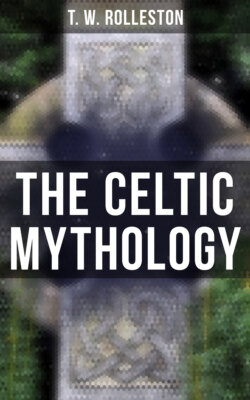Читать книгу The Celtic Mythology - T. W. Rolleston - Страница 64
На сайте Литреса книга снята с продажи.
The Five Factors in Ancient Celtic Culture
ОглавлениеTo sum up the conclusions indicated: we can, I think, distinguish five distinct factors in the religious and intellectual culture of Celtic lands as we find them prior to the influx of classical or of Christian influences. First, we have before us a mass of popular superstitions and of magical observances, including human sacrifice. These varied more or less from place to place, centring as they did largely on local features which were regarded as embodiments or vehicles of divine or of diabolic power. Secondly, there was certainly in existence a thoughtful and philosophic creed, having as its central object of worship the Sun, as an emblem of divine power and constancy, and as its central doctrine the immortality of the soul. Thirdly, there was a worship of personified deities, Æsus, Teutates, Lugh, and others, conceived as representing natural forces, or as guardians of social laws. Fourthly, the Romans were deeply impressed with the existence among the Druids of a body of teaching of a quasi-scientific nature about natural phenomena and the constitution of the universe, of the details of which we unfortunately know practically nothing. Lastly, we have to note the prevalence of a sacerdotal organisation, which administered the whole system of religious and of secular learning and literature,72 which carefully confined this learning to a privileged caste, and which, by virtue of its intellectual supremacy and of the atmosphere of religious awe with which it was surrounded, became the sovran power, social, political, and religious, in every Celtic country. I have spoken of these elements as distinct, and we can, indeed, distinguish them in thought, but in practice they were inextricably intertwined, and the Druidic organisation pervaded and ordered all. Can we now, it may be asked, distinguish among them what is of Celtic and what of pre-Celtic and probably non-Aryan origin? This is a more difficult task; yet, looking at all the analogies and probabilities, I think we shall not be far wrong in assigning to the Megalithic People the special doctrines, the ritual, and the sacerdotal organisation of Druidism, and to the Celtic element the personified deities, with the zest for learning and for speculation; while the popular superstitions were merely the local form assumed by conceptions as widespread as the human race.
